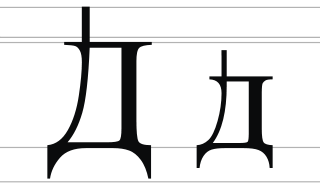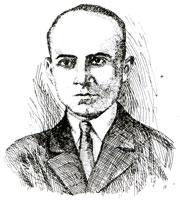Related Research Articles

Russian is an East Slavic language mainly spoken across Russia. It is the native language of the Russians, and belongs to the Indo-European language family. It is one of four living East Slavic languages, and is also a part of the larger Balto-Slavic languages. Besides Russia itself, Russian is an official language in Belarus, Kazakhstan, and Kyrgyzstan, and is used widely as a lingua franca throughout Ukraine, the Caucasus, Central Asia, and to some extent in the Baltic states. It was the de facto language of the former Soviet Union, and continues to be used in public life with varying proficiency in all of the post-Soviet states.
Transliteration is a type of conversion of a text from one script to another that involves swapping letters in predictable ways, such as Greek ⟨α⟩ → ⟨a⟩, Cyrillic ⟨д⟩ → ⟨d⟩, Greek ⟨χ⟩ → the digraph ⟨ch⟩, Armenian ⟨ն⟩ → ⟨n⟩ or Latin ⟨æ⟩ → ⟨ae⟩.

Cyrillization or Cyrillisation is the process of rendering words of a language that normally uses a writing system other than Cyrillic script into the Cyrillic alphabet. Although such a process has often been carried out in an ad hoc fashion, the term "cyrillization" usually refers to a consistent system applied, for example, to transcribe names of German, Chinese, or English people and places for use in Russian, Ukrainian, Serbian, Macedonian or Bulgarian newspapers and books. Cyrillization is analogous to romanization, when words from a non-Latin script-using language are rendered in the Latin alphabet for use
The Russian march is an annual demonstration in which several Russian nationalist organizations participate, many of them neo-Nazi, in several major Russian cities under the slogan "it's our country", attached to 4 November, the Day of National Unity. Among the most notable participants were the Movement Against Illegal Immigration, the main organiser of rallies, Eurasian Youth Union of Alexander Dugin, Dmitry Demushkin, the National State Party of Russia and the State Duma deputy Nikolay Kuryanovich who was excluded from the Liberal Democratic Party of Russia for his sympathy with the March. Other participants were the National Patriotic Front "Memory", the "Truth" Community, the Russian National Union, the Russian Social Movement and the "Russian Order" Movement led by Vasily Ansimov.
In computing, Russification involves the localization of computers and software, allowing the user interface of a computer and its software to communicate in the Russian language using Cyrillic script.
The Russian Orthodox Cross is a variation of the Christian cross since the 16th century in Russia, although it bears some similarity to a cross with a bottom crossbeam slanted the other way (upwards) found since the 6th century in the Byzantine Empire. The Russian Orthodox cross has three horizontal crossbeams, with the lowest one slanted downwards. Nowadays it is a symbol of the Russian Orthodox Church and a distinctive feature of the cultural landscape of Russia. Other names for the symbol include the Russian cross, and Slavonic or Suppedaneum cross.

Alexander Nikolaevich Tarasov is a Soviet and Russian left-wing sociologist, politologist, culturologist, publicist, writer, and philosopher. Up until the beginning of the 21st century he referred to himself as a Post-Marxist alongside István Mészáros and a number of Yugoslav Marxist philosophers who belonged to Praxis School and emigrated to London. Since in the 21st century the term Post-Marxism has been appropriated by Ernesto Laclau, Chantal Mouffe and their followers, Alexander Tarasov stopped referring to himself as a Post-Marxist.

Prince Kirill Alexandrovich Romanovsky-Iskander, or Cyril Iskander Romanov, or simply Prince Iskander, was one of the last two members of the House of Romanov to remain alive in Russia following the Revolution.

The Greek Battalion of Balaklava was a military unit of the Imperial Russian Army which participated in the Russo-Turkish wars of 1768–1774, 1787–1792 and 1806–1812. It consisted of Greek expatriates who were living in the Balaklava area.
The year 1966 was marked by many events that left an imprint on the history of Soviet and Russian Fine Arts.
The year 1951 was marked by many events that left an imprint on the history of Soviet and Russian Fine Arts.
The year 1928 was marked by many events that left an imprint on the history of Soviet and Russian Fine Arts.
The year 1929 was marked by many events that left an imprint on the history of Soviet and Russian Fine Arts.

Konstantin Fyodorovich Chelpan was a prominent Soviet engineer of Greek background. Head of the Engineering Design Bureau of the Kharkiv Locomotive Factory, chief designer of the T-34 tank engine. Awarded the Order of Lenin, he was politically repressed and executed under a mass persecution ordered by Joseph Stalin, but politically rehabilitated after death.

Yury Mikhaylovich Kublanovsky is a Russian poet, essayist, critic and art historian, known for his dissident past, started in the informal literary union SMOG. The author of dozens of lyrical books appearing in America, France, and Russia.

Russian folk dance is an important part of Russian culture. Some of the unique characteristics suggest that many elements were developed by the early Russian population.

Metropolitan Tikhon is a bishop of the Russian Orthodox Church and a popular writer. He is the Metropolitan of Pskov and Porkhov and was in 2015–2018 the head of the Western Vicariat of Moscow city. Superior of the Sretensky Monastery in Moscow from 1995 to 2018. Bishop Tikhon is often referred to as the personal confessor of Russian President Vladimir Putin.

The "Russian world" is the concept of social totality associated with Russian culture. Russkiy mir as a concept comprises the core culture of Russia and is in interaction with the diverse cultures of Russia through traditions, history and the Russian language. It comprises also the Russian diaspora with its influence in the world. The concept is based on the notion of "Russianness", and both have been considered ambiguous. The "Russian world" and awareness of it arose through Russian history and was shaped by its periods.

The Greek Legion, officially the Light Jäger Foot Legion, was a Jäger infantry unit in the service of the Russian-controlled Septinsular Republic. It consisted of soldiers of Greek and Albanian origin and was led by Major-General Emmanouil Papadopoulos. It was active between 1805 and 1807, taking part in the War of the Third Coalition and the Russo-Turkish War (1806–1812).

The Greek Volunteer Legion was a volunteer military corps formed by Greeks and other Balkan Christians that fought for the Russian Empire during the Crimean War. It was formed in the Danubian Principalities in March 1854, and some elements participated in the final engagements of the Danube theatre, before the Russian troops abandoned the Principalities. From there the Legion was sent to the Crimea, where it fought in the Siege of Sevastopol. In 1855 the Legion received the title Greek Legion of Emperor Nicholas I. After the end of the siege, the bulk of the Legion was discharged, and the remainder of the unit was disbanded after the war's end in March 1856. Most of the volunteers returned to their homelands, although a few settled in Russia.
References
- ↑ Salnova, A. V. (2005). Греческо-русский и русско-греческий словарь[Greek–Russian and Russian–Greek Dictionary]. Moscow: Русский язык Медиа. ISBN 5-9576-0124-1.
- ↑ Borisova, A. B. (2004). Греческий без репетитора[Greek Without a Tutor]. Moscow: Корона. pp. 8–10. ISBN 5-89-815-482-5.